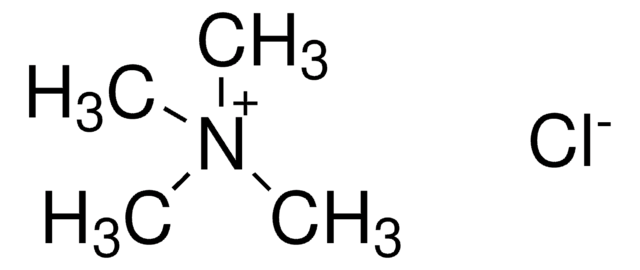추천 제품
Grade
for molecular biology
for molecular biology
Quality Level
무균
0.2 μm filtered
제품 라인
BioReagent
형태
solution
농도
1 M
불순물
DNase, RNase, NICKase and protease, none detected
pH
8.0
응용 분야
agriculture
SMILES string
Cl.NC(CO)(CO)CO
InChI
1S/C4H11NO3.ClH/c5-4(1-6,2-7)3-8;/h6-8H,1-3,5H2;1H
InChI key
QKNYBSVHEMOAJP-UHFFFAOYSA-N
유사한 제품을 찾으십니까? 방문 제품 비교 안내
일반 설명
Trizma® hydrochloride solution is a useful biological buffer.
애플리케이션
Trizma® hydrochloride solution may be used in the following studies:
- As buffer for the 2-D electrophoresis of rat fibroblast cell.
- As buffer for the rapid isolation of high molecular weight plant DNA (50,000 base pairs or more in length).
- Selective immunoprecipitation of biotin-labeled DNA with antibiotin IgG and Staphylococcus sp.
The pH values of all buffers are temperature and concentration dependent. For Tris buffers, pH increases about 0.03 unit per degree C decrease in temperature, and decreases 0.03-0.05 unit per ten-fold dilution.
For precise applications, use a carefully calibrated pH meter with a glass/calomel combination electrode.
For precise applications, use a carefully calibrated pH meter with a glass/calomel combination electrode.
기타 정보
Prepared with pH-adjusted Biotechnology Performance Certified Trizma Base in 18 megohm water and 0.2 μm filtered.
법적 정보
Trizma is a registered trademark of Merck KGaA, Darmstadt, Germany
Storage Class Code
10 - Combustible liquids
WGK
WGK 2
Flash Point (°F)
Not applicable
Flash Point (°C)
Not applicable
개인 보호 장비
Eyeshields, Gloves, type ABEK (EN14387) respirator filter
시험 성적서(COA)
제품의 로트/배치 번호를 입력하여 시험 성적서(COA)을 검색하십시오. 로트 및 배치 번호는 제품 라벨에 있는 ‘로트’ 또는 ‘배치’라는 용어 뒤에서 찾을 수 있습니다.
이미 열람한 고객
Lisa W von Friesen et al.
Marine pollution bulletin, 142, 129-134 (2019-06-25)
Standardized methods for the digestion of biota for microplastic analysis are currently lacking. Chemical methods can be effective, but can also cause damage to some polymers. Enzymatic methods are known to be gentler, but often laborious, expensive and time consuming.
P R Langer et al.
Proceedings of the National Academy of Sciences of the United States of America, 78(11), 6633-6637 (1981-11-01)
Analogs of dUTP and UTP that contain a biotin molecule covalently bound to the C-5 position of the pyrimidine ring through an allylamine linker arm have been synthesized. These biotin-labeled nucleotides are efficient substrates for a variety of DNA and
M G Murray et al.
Nucleic acids research, 8(19), 4321-4325 (1980-10-10)
A method is presented for the rapid isolation of high molecular weight plant DNA (50,000 base pairs or more in length) which is free of contaminants which interfere with complete digestion by restriction endonucleases. The procedure yields total cellular DNA
Emilie M F Kallenbach et al.
The Science of the total environment, 786, 147455-147455 (2021-05-09)
Chitinaceous organisms have been found to ingest microplastic; however, a standardised, validated, and time- and cost-efficient method for dissolving these organisms without affecting microplastic particles is still required. This study tested four protocols for dissolving organisms with a chitin exoskeleton:
F Gharahdaghi et al.
Electrophoresis, 20(3), 601-605 (1999-04-27)
Mass spectrometry is a powerful technique for the identification of proteins at nanogram quantities. However, some degree of sample preparation prior to mass spectrometry is required, and silver-stained protein gel samples are most problematic. Here we report our strategy to
자사의 과학자팀은 생명 과학, 재료 과학, 화학 합성, 크로마토그래피, 분석 및 기타 많은 영역을 포함한 모든 과학 분야에 경험이 있습니다..
고객지원팀으로 연락바랍니다.









